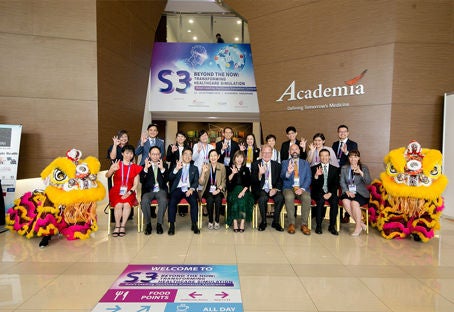
Following the success of the first Conference in 2017, the second S3 Conference returned in 2019, gathering more than 500 healthcare professionals, simulation technologists and educators from Asia, Europe and USA. Organised by three leading simulation institutes – the SingHealth Duke-NUS Institute of Medical Simulation (SIMS) from Singapore, SESAM from Europe and SimGHOSTS from the United States, the S3 Conference has served as a platform for healthcare professionals around the world to share the latest knowledge and skills in healthcare simulation.
Read on to find out about highlights of the Conference as well as five key takeaways!
+++
 |  |
| Delegates trying out the latest simulation equipment and technology at the S3 Conference 2019 | |
Jointly organised by SIMS and Serious Games Association (SGA), the finals of the inaugural SIMS Games Challenge 2019 offered teams the opportunity to design serious games to enhance healthcare learning. Five teams were shortlisted from 17 submissions to develop prototypes of their proposed games. The games were presented to a panel of judges at the finals, and delegates had the opportunity to learn about the teams’ experiences in developing the games, as well as watch live demonstrations of the game prototypes.
 |  |
| Teams explaining their game prototypes and the journey behind creating these games | Judges offering their thoughts and comments on the game prototypes |
 |  |
A presenter sharing about her poster in more detail during the judging | Delegates viewing the posters |
Five Key Takeaways from the S3 Conference
At the S3 Conference, more than 60 thought leaders and experts in simulation offered their perspectives on the trends and developments in healthcare simulation. Here are five key takeaways from the conference:
Empowering Lifelong Learning and Innovation through Simulation
In the Day 1 Keynote Lecture, Dr David Grant, Simulation and Interprofessional Education Lead, University of Bristol Medical School, UK, highlighted how simulation can be integrated into healthcare organisations for the delivery of better patient care. Simulation functions as a form of proactive and dynamic risk management by allowing organisations the safe space to make mistakes, identify and resolve issues encountered along patient care pathways. It also builds a culture of sharing, lifelong learning and innovation, where healthcare professionals are empowered to see that they hold the answers which others need.
Ensuring the Delivery of High Quality Simulation-Based Education
In the Expert Panel on “Quality Assurance in Simulation”, panellists discussed markers of quality in healthcare simulation-based education. One of these benchmarks was for learners to display improved proficiency/increased confidence after the simulation training. In order to ensure that participants truly engage with a simulation programme, two important conditions need to be fulfilled:
2. Clear definable goals for the training, i.e., faculty need to identify the needs of learners and the suitability of the medium in teaching what needs to be demonstrated.
Successfully Commercialising Simulation Technology to Impact Patient Care
In the Day 2 Keynote Lecture, Prof Bernard Morrey, Emeritus Consultant at the Mayo Clinic, USA, pointed out that simulation technology can greatly improve the value of patient encounters. Hence, there is a pressing need to successfully commercialise simulation technology; particularly disruptive technology (i.e., technology which is capable of making the greatest global impact). He identified practical concerns to note during the commercialisation process, such as understanding the strength of the concept, being supported by competent and experienced personnel, having a strong business plan, as well as adequate time and funding.
Offering Deeper Learning Experiences Through Hybrid Simulation
In the Day 3 Keynote Lecture, Prof Fatimah Lateef, Co-Director for SIMS, shared on the concept of patient-focused hybrid simulation, where two or more modalities are combined in simulation training. Successful simulation training is a fictional contract between the parties involved, and requires a suspension of disbelief in order to be effective. Hybrid simulation elevates the fidelity of the simulation, which can lead to enhanced technical skills, clinical reasoning, as well as deeper and more satisfying experiences for learners.
Integrating Latest Technology into Simulation Training
In the Day 3 Keynote Lecture, Prof Patrea Andersen, Academic Director for Simulation and Visualisation from the University of Sunshine Coast, Australia, outlined emerging technologies used in simulation e.g., immersive visualisation technologies and 3D virtual environments. However, she emphasised that the crux of simulation training remains in helping learners read, understand and visualise the content. Learning outcomes need to determine the modality used, and educators need to adjust their facilitation methods accordingly to help learners connect knowledge to real-life clinical practice.
 |  |  |
| Delegates enjoy hands-on opportunities for learning | Our Expert Panel (Dr David Grant, Prof Debra Nestel, Dr Marc Lazarovici and Dr Stefan Gisin) discussing quality in healthcare simulation | Delegates engaging in fruitful discussions during a workshop session |
Hear from Our Delegates
Senior Staff Nurse, Singapore General Hospital
“The S3 Conference was a wonderful platform for me to understand the world of simulation and its integration in healthcare curriculum. It is certainly the need of the hour!”
Dr Rahul Kashyap
“As a medical student, the Conference was a fantastic opportunity for me to broaden my perspective with regards to future of healthcare. It was a tremendous opportunity for interdisciplinary growth and development. It was a pleasure to learn from experts in world of healthcare simulation as well as showcase the work being done by my institution at such a prestigious stage.”
Bookmark www.s3.sg or follow us on Instagram @s3conference for the latest updates!













 Get it on Google Play
Get it on Google Play